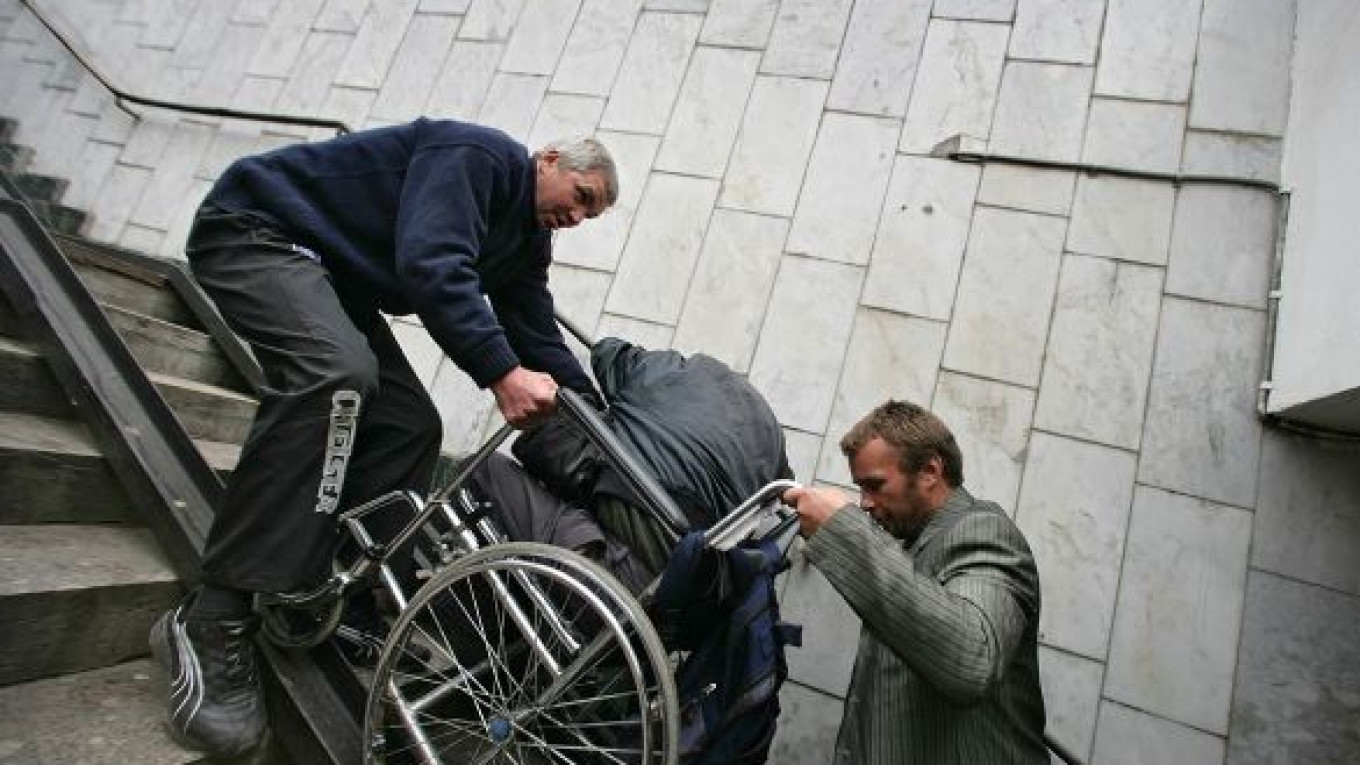Yevgenia Gurova, a 21-year-old student, is seething after St. Petersburg authorities banned her from entering or exiting metro stations with escalators.
That means she is only allowed access to the seven city metro stations with stairs. The other 57 stations are off-limits.
"If they think that the stairs are safer, they are wrong," Gurova said by telephone Tuesday.
Gurova, who was banned from entering the metro in her wheelchair twice late last week, brought the ban into the spotlight over the weekend by complaining to St. Petersburg Governor Valentina Matviyenko.
"They should find other, more appropriate ways to deal with the problem," Gurova said.
The problem she is referring to is a recent series of accidents in which people in wheelchairs tumbled down the escalators, a metro spokeswoman said by telephone, without elaborating on the accidents.
The ban is not new, but metro staff began enforcing it after the accidents for the safety of people in wheelchairs, she said, speaking on customary condition of anonymity.
The ban draws new attention to the difficulties encountered by disabled people in Russia, where access to public facilities is limited or nonexistent.
In an appeal Saturday on Democrator.ru, a web site for public complaints to officials, Gurova called the metro the most accessible transportation for the disabled and the only possible means of transportation for them in the winter.
Gurova asked Matviyenko to take action on the issue without delay and "cancel the illegal order."
Matviyenko has not replied to Gurova's appeal, but her deputy, Yury Molchanov, has ordered St. Petersburg metro head Vladimir Garyugin to initiate a tender for equipment that would allow wheelchair users to safely enter and leave the stations, the city government said in an e-mailed statement.
The statement said new stations would be equipped with ramps for wheelchairs, but no mention was made about lifting the ban.
City ombudsman Alexei Kozyrev the ban, and Public Chamber member Yelena Nikolayeva called it a "worldwide shame" and "direct violation of federal laws," RIA-Novosti .
Federal legislation obliges local authorities to provide the disabled unimpeded access to public facilities. However, failure to do so carries small fines of up to 3,000 rubles ($110) for individual officials and 30,000 rubles for state bodies.
Kozyrev promised to make sure that the metro chief, whom he has contacted, finds a solution to the problem.
There are 235 escalators in the St. Petersburg metro's 64 stations, but none have elevators for the disabled, according to the metro's web site.
Russia's infrastructure for wheelchair users is virtually nonexistent, even in big cities like Moscow and St. Petersburg, which effectively confines many to their homes.
But the Moscow metro does not ban people in wheelchairs from using escalators at their own risk, metro spokeswoman Svetlana Tsaryova told The Moscow Times. She refused to comment on how safe it is.
Moreover, Moscow metro rules explicitly oblige workers to cater to passengers in wheelchairs — unlike the metro rules in St. Petersburg.
That does not mean, however, that traversing the Moscow metro in a wheelchair is easy. Of the 182 stations, only a handful of recently built ones are equipped with elevators and ramps for wheelchairs. The majority of stations, built in Soviet times, do not have such facilities, and their construction does not allow them to be adapted for wheelchair use, Tsaryova said.
A Message from The Moscow Times:
Dear readers,
We are facing unprecedented challenges. Russia's Prosecutor General's Office has designated The Moscow Times as an "undesirable" organization, criminalizing our work and putting our staff at risk of prosecution. This follows our earlier unjust labeling as a "foreign agent."
These actions are direct attempts to silence independent journalism in Russia. The authorities claim our work "discredits the decisions of the Russian leadership." We see things differently: we strive to provide accurate, unbiased reporting on Russia.
We, the journalists of The Moscow Times, refuse to be silenced. But to continue our work, we need your help.
Your support, no matter how small, makes a world of difference. If you can, please support us monthly starting from just $2. It's quick to set up, and every contribution makes a significant impact.
By supporting The Moscow Times, you're defending open, independent journalism in the face of repression. Thank you for standing with us.
Remind me later.






